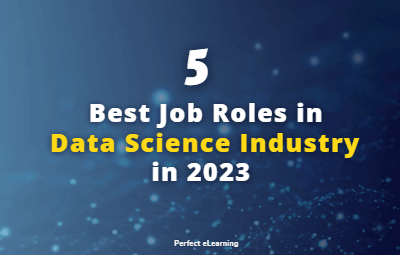

Data science has been a highly desired field by both job-applicants and hiring managers. Data science was ranked as the most promising career of the year in 2019 by LinkedIn, based on a 56% increase in job openings and salary projections from 2018.
But is COVID-19 leaving an impact on data sciences roles? If yes, then up to what extent?
According to a recent survey by July Burtch Works, in the United States, COVID 19 pandemic has not significantly affected data science opportunities or salaries. But there is more, it seems data science opportunities could actually be growing: according to the survey, 50% of data science and analytics organizations have either suffered no impacts (42.1%) or have actually grown in size (7.6%).
Few reasons why data science jobs continue to grow compared to other industries are:
- Data-driven approaches has proven ROI for organizations investing in analytics and can help companies cut costs
- Data science jobs can be easily done remotely
- Data science is particularly valuable in these economic conditions. Many companies are hiring data scientists to track pandemic-related behaviors, forecast market trends, and develop new models and simulations to understand opportunities for recovery
So, if you’re trying to start a job-search for the first time in data science or looking to change firms, here are a few ways to land a data science job during COVID-19.
Find the right job for you
There are too many people interacting with data and it is very important to ensure that you are applying to the right job-role.The role of a data scientist may vary depending on the size and state of the company. Data scientist and data analyst jobs are different from each other.
Data scientist positions at top tech companies give platforms for more specialization in a niche area and can also provide a good training ground, as many of these hire for internships and new grad positions.
For people looking for stability and to grow their skill-set in a larger pool, big companies like Pinterest, Lyft, Uber, and Facebook offer the highest salaries in this industry, backed with strong benefits packages and investment in training and education.
Startups provide a high level of ownership and may let you build a lot of the infrastructure for scalable experimentation and data analysis. If you are creative and innovative and can make high risk/reward tradeoff, check out these top-ranked data science and machine learning startups.
Freelancing in the data science field can provide a lot of freedom, with the ability to set your own rates, working hours, and terms. So, if you enjoy independence and prefer running your own business, you can use popular platforms and job boards like Upwork, Fiverr, TopTal, Coding Ninjas, and Angellist to get data science jobs and build your portfolio of projects. It could take a while to receive a steady flow of freelance contracts and projects.
Learn more about becoming a freelance data analyst.
Improve your data skills through an online course
Candidates are often rejected at the onset of the job interview process because they fail to meet job requirements. Although many data science jobs prefer a bachelor’s degree or Master’s degree in computer science, applied mathematics, statistics, economics, or related technical fields, it is reasonably affordable to make career decisions during social distancing with online courses and certification programs.
While each company has its own strict requirements, here are some valuable skills that all data science job applicants should possess:
- Programming skills : Python is the most popular data science language, but the programming languages R, C++, and Java/Hadoop are also used. Few jobs may require experience in a scripting language, like PHP or Perl.
- Advanced math skills : Statistical data analysis may involve experience with linear models, multivariate analysis, stochastic models, sampling methods, applied optimization, and Marketplace, Bayesian, or forecasting models. Having a strong quantitative knowledge will definitely help.
- Data skills : You need to master data management (collecting and cleaning datasets), data manipulation, and data visualization. SQL enables management of relationships between large data sets, while Tableau, Power BI, and other tools can help present data to other stakeholders in an easy-to-understand format.
- Machine learning skills : When working with big data, you may be required to use both supervised and unsupervised algorithms and reinforcement learning. Machine learning is a more advanced field of data science, but if you are interested in this specialization, this Perfect Plan B article goes over some key skills and theoretical knowledge to get a machine learning job.
- Business skills and soft skills : Since data scientists have to deal with core problems around how to improve efficiency, revenue, and user experience, a deep understanding of how the business works, in addition to critical thinking, communication, and teamwork skills is helpful.
Create your online presence
COVID-19 has changed the pattern of hiring. Recruiters are now focusing on virtual employer branding, outreach, and assessment tools.
Here are few recommendations for that you may use to get a data science job through online searches:
- Update your LinkedIn profile: Recruiting managers are actively using LinkedIn to find promising candidates during COVID-19. A recent study showed that recruiters spend 1/5 of their time on LinkedIn profile photos, so first impressions definitely matter. Use a professional image, create a summary section optimized for SEO/Trending keywords, and make sure past work experience is up-to-date.
- Update your resume & any online portfolios or personal websites. To create a compelling data science resume, remember that recruiters are looking for a first impression. Do your research, extract out important keywords mentioned in the job descriptions, use appealing fonts, mention experience with technical skills, and quantify your impact. You can also include a Github portfolio and show that you’ve collaborated and contributed to stand out.
- Strengthen virtual interviewing skills. Companies have quickly adopted virtual interviewing tools. To succeed at interviewing through Zoom, Google Meet, MS Teams, or other platforms, the Society of Human Resource Managers (SHRM) recommends double-checking your tech (camera, microphone, and Internet speed), selecting a quiet, well-lit room, and ensuring that you’ve properly adjusted your calendar for different time zones. Do practice sessions.
Negotiating and closing the offer
Once you’ve landed a few data science offers, the fun begins as you have the leverage to seal the deal.
- Salary is negotiable : Most employers expect pushback on their initial offer, so set a high starting salary, but also know your Best Alternative to a Negotiated Agreement (BATNA)—or the final offer you are willing to settle for.
- Leverage competing offers : Applying to multiple companies will definitely increase your options and also give you one more benchmark to determine how much to ask for. Most large tech companies will try to compete with their competitor’s offers.
- Consider the complete package : During a pandemic, many people’s values shifted, with 81% saying that company culture is very important. Does the company offer flexible hours? Will remote work be allowed longer-term? Many startups offer equity and larger companies include stock options, so it’s important to understand the terms and conditions of the types of shares you are awarded, as well as the differences between cash and non-liquid compensation.
COVID-19 presents unique opportunities for remote data science jobs (both freelancing and permanent work-from-home options), opening up a larger job pool for qualified candidates. By taking advantage of this time to enter into data science or refine your data science skill-set, you can succeed in a high-demand profession and benefit from a job market that will continue to thrive in the midst of a global pandemic.
Perfect Plan B’s online mentor-driven Data Science Course coupled with job placement assistance may be the right launchpad to embark on this exciting career journey. Perfect Plan B also offers a unique opportunity for the students to avail scholarships on all courses so that finance never becomes an issue in education. With #P2BLearning you can Learn Now, Pay Later!
Perfect eLearning offers basic & advanced coding tutorials for people who want to learn how to code.
Topics:
1. Introducing the best basic coding courses online.
2. The benefits of taking coding courses online.
3. The top three coding courses online that you should check out.
4. How to get started with coding courses online.
5. The best way to learn to code online.
6. The future of coding courses online.
7. Introducing the basics of coding
8. The benefits of learning to code
9. Types of coding tutorials available
10. How to get started with coding
If you're looking to learn to code, there are a variety of ways you can go about it. But, if you're looking for the easiest and most efficient way to learn, then these 5 steps are the way to go:
1. Choose the right language.
2. Use coding boot camps.
3. Use online coding communities.
4. Use online coding tutorials.
5. Use online coding examples.
For more details, you can talk to our experts.
Perfect eLearning
Learn & Grow!


